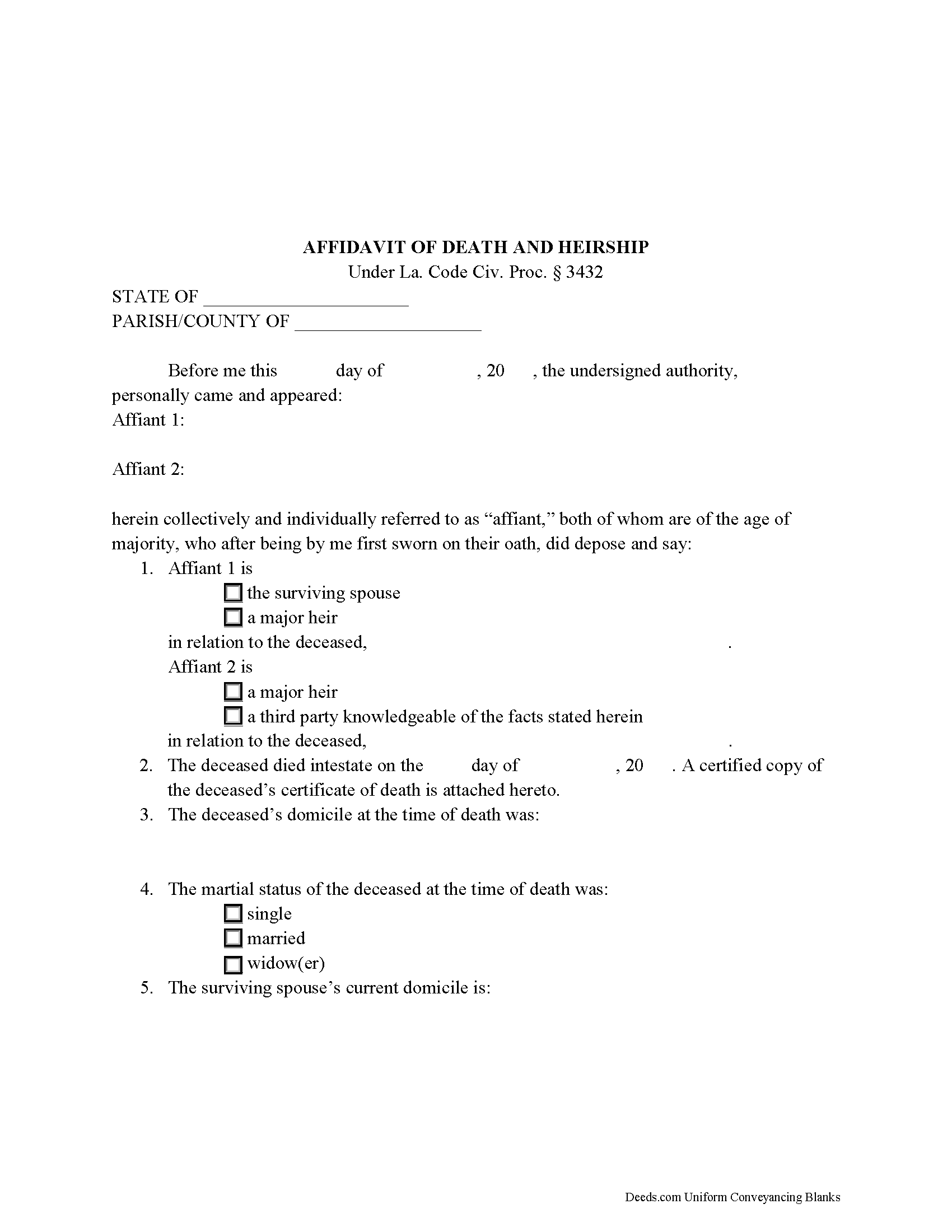Download Louisiana Affidavit of Death and Heirship Legal Forms

Louisiana Affidavit of Death and Heirship Overview

When a decedent dies, her property, rights, and obligations at the time of death, and those acquired after death, comprise her estate (La. Civil Code Art. 872). The legal process of transferring a decedent's estate to successors is referred to as succession in Louisiana.
By operation of law, a decedent's heirs automatically succeed to an interest in the decedent's property at the decedent's death (Civil Code Art. 935). Though a judicial process may not be required, heirs must take steps to "conform the record title to the rights of ownership provided by" Louisiana Code. Failure to do so "inhibits the ability of family members lacking record title to exercise their rights of ownership of property including the rights to sell, to encumber, and to seek federal aid" in the future. Filing the correct document in the parish land records updates the chain of title and provides a clear record of succession. Consult an experienced succession lawyer to advise which process is appropriate for the situation.
There are several alternate options in Louisiana for transferring property from a decedent to his heirs, such as small succession, a judicial process, or filing an affidavit under La. Code of Civil Procedure Art. 3432, a non-judicial process. These options are available when the estate meets certain requirements.
When the size of the estate is less than $125,000.00, or the succession in Louisiana is ancillary to probate or succession opened elsewhere, the estate may qualify as a small succession under La. Code of Civil Procedure Art. 3421. A judicial succession is always required when a decedent dies testate (with a will), regardless of the estate size.
Small succession is not required, however, when the conditions above apply AND the decedent died intestate with his sole heirs being descendants (children), ascendants (parents), siblings or descendants of siblings, and/or a surviving spouse (CCP 3431). Exceptions also apply for wills probated outside Louisiana.
When a small succession is not required because the decedent died intestate and her sole heirs are those stated above, file an affidavit of death and heirship under La. Code of Civil Procedure Art. 3432.
A minimum of two people must execute the affidavit, including the surviving spouse, if applicable, and one or more heir of the age of majority (18) in the State of Louisiana. An affiant may also be a third party with knowledge of the facts contained within. Art. 3432 of the Code of Civil Procedure indicates an option for one or more original affidavits in some situations. The wrong paperwork can lead to unnecessary expenses, so consult an attorney to confirm the best procedure for the specific case.
Note the name, address, and relation of each affiant to the decedent in the affidavit. The affiants must be duly sworn before any officer or person authorized to administer oaths in the place where the affidavit is executed.
Statutory requirements for the content of the affidavit include the decedent's date of death and his address of primary residence at the time of death; a statement that the decedent died intestate; the martial status at the time of death and the surviving spouse's last-known residence, if applicable.
In addition, the affidavit lists the name, last known address, and relationship to the decedent of each heir. Each heir's respective interest in the decedent's property, and whether a legal usufruct of the surviving spouses attaches to the property, should be noted. If any heir does not join as an affiant, the affidavit should state that either the heir could not be located or was given notice of the intent to execute the affidavit and did not object.
The affidavit describes the property left by the decedent and indicate whether the property is community property or separate property. The description of any immovable property "must be sufficient to identify the property for purposes of transfer" (CCP 3432(A)(5)). The affidavit should also show the value of each item of property and the aggregate value of all property at the time of death.
Finally, the affiant's signature affirms that the signers accept the succession of the decedent and that the information contained in the affidavit is true, correct, and complete to the best of the signer's knowledge. The statements are made under penalty of perjury.
Aside from these content requirements, the affidavit must be in recordable form. File the affidavit along with a copy of the decedent's death certificate in the conveyancing records of the parish where the immovable property described within the document is situated. When the affidavit pertains to immovable property, file after 90 days have passed since the decedent's death.
Consult an experienced succession lawyer in the State of Louisiana with questions about immovable property, affidavits of death and heirship, any other issues related to probate or decedent's property in Louisiana, as the law is complex, and each situation is unique.
(Louisiana AOD Package includes form, guidelines, and completed example)